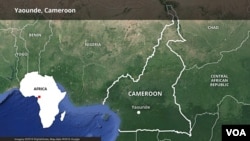Cameroon's military said Friday it has killed at least 43 armed separatists fighting for the creation of an English-speaking state in the Central African nation.
Troops have destroyed at least three camps in several operations since Thursday in Bali village in the Mezam administrative area and Abu village in the Fundong administrative area in the North West region, said their commander, Gen. Agha Robinson. The military seized a huge consignment of guns, ammunition, machetes, motorcycles and drugs, he said.
The military found the separatist hideouts after tracking one of the gunmen suspected of kidnapping 79 students and three staff members from a school on November 4, Robinson said. All have since been freed.
"We are more than ever before determined to end these attacks on civilians and the destruction of property," he said. "We count on the collaboration of the population that is fed up with the killings and kidnappings carried out by the armed gangs."
Hundreds have been killed in Cameroon's English-speaking South West and North West regions in months of fighting between the military and separatists. During his inauguration this month, President Paul Biya urged the fighters he calls "terrorists" to drop their guns and be forgiven or prepare to be killed by the military.
Since then, raids have been carried out in 11 villages in the North West.
North West Governor Deben Tchoffo said there were no military casualties in the latest operations but armed gangs ambushed a military convoy in Bali village.
Bali resident Doh Kingsley, however, said they found two corpses in military uniforms in the village. He said the military retaliated by burning 11 houses, including his family's.
"People including old mothers fled to the bushes," he said. "Some are now escaping to safer localities and may only return when the military leaves."
The Cameroon unrest began in 2016 when English-speaking teachers and lawyers in the North West and South West staged demonstrations calling for reforms, criticizing what they called the marginalization of the Anglophone population, which accounts for about one-fifth of the largely French-speaking country's 25 million people.
Violence increased after the government cracked down on protests and groups of separatists armed themselves. They have vowed to destabilize the region, and hundreds of thousands of civilians have fled, with dozens of schools burned and teachers threatened. Others have also taken up arms, including gangs.







